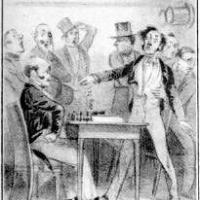
Your Questions Answered 7/13
Anonymous asked:
I thought chess was supposed to be a gentleman’s game, but at times my opponents act rudely during tournament play. What can I do about this?
Dear Anonymous:
During a tournament in Los Angeles, two players got into a fight while playing and began stabbing each other with their pens. This is probably not a good way to deal with a rude opponent. In fact, the only correct thing to do when an unruly imbecile is sitting opposite you is to find the tournament director and ask him to put an end to your opponent’s deplorable behavior before it escalates into something like the aforementioned pen battle.
Rude and/or crazy behavior is a time-honored part of the game. The 16th Century Spanish priest and chess player Ruy Lopez de Segura recommended that, when playing outside, you should always face your opponent toward the sun so he will be blinded during key moments of the game. I’ve personally faced players that covered the whole spectrum of bizarre behavior: one guy would whistle a song (his tone would get more dominating if he felt he was doing well, and it would taper off into a beaten, pathetic drone if he was losing), another would mumble, an old man made disgusting gagging sounds from the first move to the last, another old man kept saying, “Go get the body! Go get the body!” over and over, and one guy that appeared to have a bird’s nest on his head kept picking at it, popping whatever he had gotten from the nest into his mouth.
Here are a few more that I’ve faced, all of which are 100% true:
A famous IM used to empty one of those huge plastic coke bottles and fill it with tequila. He’d keep it on the table, ready for use in case of an “emergency”. His philosophy was, if something unpleasant happens on the board, take several deep glugs directly from the bottle and drink your worries away. He tried this on me once, emptied the bottle, and ended up with his face literally lying flat on the table. When it was his turn to move, his hand would rise up blindly, grope for a piece to move, and then (after pushing some piece somewhere) fall limply back to the ground. After he hung all his pieces, he quietly resigned and stumbled out of the hall.
I first experienced this one while playing a well-known chess politician. After I made a move that my esteemed opponent felt was annoying, he slowly took a sandwich out of his backpack, carefully unwrapped it, and then took huge, loud bites – chomping sickeningly as if he was a lion eating human flesh. Once the sandwich was consumed, he then made eye contact with me, smiled, calmly reached into his pocket, and took out some dental floss. Then he flossed away, bits of sandwich flying all over the board.
One famous American grandmaster always acted in a polite way – if things were going well. But as soon as his position soured, he’d try any trick in the book to break your concentration. We had played 3 times before, with me winning one and drawing two. This time we were playing in the last round for (potentially) first place in a major event (it turned out that it was only good for second since my competitor also won). As usual, he started out as a gentleman. However, after he’d made a mistake he became belligerent and started kicking me under the table. I looked up, said, “Hey, what in the hell do you think you’re doing? Stop it!” but he just kept on kicking. Fortunately, I was married to my first wife at that time and had learned how to tune out unpleasant things, so I went on to win the game.
Many decades ago, I was teaching a 14 year-old girl that was all the rage. She did TV interviews, was big with celebrities, and was considered to be the next big chess thing by many pundits. While watching her play a tournament game, she hung a piece and, shockingly, quickly wrote a letter and handed it to her opponent under the table. It said, “Please don’t take my piece. My father will beat me if you do!”
Finally, when things have gone badly and it’s time to resign, some players have a final bit of fun by making use of creative ways to give up. Alekhine once threw his King across the room while screaming, “How can I lose to this idiot!?” While playing an event in London, an opponent of mine found a far calmer way to end the game – he simply pushed all the pieces off the board and onto my lap, and then got up and walked out of the tournament hall.
Kxg asks:
I've been playing chess for several months now, trying to get better. One of things I don't like in my play is my Rook development, especially the queenside Rook. Sometimes it's not developed for more than half a game! And some games even end before I develop it. What can I do about this?
Dear Mr. Kxg:
This is a common problem among beginners. To solve it, you need to understand that files need to be opened, and if you want to open a file, you need to create pawn tension. Let's look at a typical example.
(Don't forget to click on MOVE LIST to see all the text and moves)






